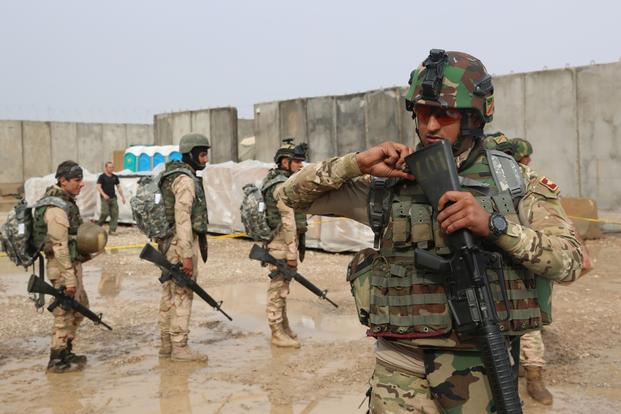One of the main ways the Iraqi army units have changed since the U.S. withdrawal is they've finally realized they have to fight their own battles, according to a U.S. Army commander who recently returned from an advise and assist mission.
About 1,300 paratroopers from 3rd Brigade Combat Team of the 82nd Airborne Division recently returned from a nine-month mission of training Iraqi army units that are now the main effort in the counterattack to retake Ramadi from militants from the Islamic State of Iraq and Syria, or ISIS.
During the deployment, the brigade formed in teams and helped to train about 12,400 new Iraqi army soldiers. The teams also worked every day with Iraqi Ground Forces Command.
"What was unique and gratifying about this mission was having the opportunity to train new units and see them go on to conduct combat operations and doing well to include forces currently fighting as the Ramadi counter attack," Col. Curtis Buzzard, commander of 3rd BCT, told reporters at the Pentagon today.
The Iraqi army forces Buzzard's unit has trained have come a long way from the days when Iraqi forces were retreating from the initial ISIS advance in Northern Iraq, he said.
The units that fled from both Ramadi and Mosul, "some of that is reflective of the type of leaders that were put into position while we weren't there," Buzzard said. "And to some degree, I can't entirely fault soldiers who left when their leaders ran.
"The units that we trained and advised are performing -- they are better trained, they are better equipped and they are better led," he added. "It may not be moving as quickly as we would like it, but there is progress this is the Iraqi's fight to win, enabled by us, but they must own it."
U.S. forces trained Iraqis in the past, but the Americans were still in the lead, Buzzard said.
Now the Iraqis know they have to lead in this fight, he said.
"It is their fight to win. I mean, we can't do it for them, it won't be sustainable if we were to do it on our own," Buzzard said. "And they recognize it and they want it to be theirs."
The advise-and-assist mission is complicated because "we can't accompany them on the battlefield," said Maj. Michael Hamilton, operations officer for 2nd Battalion, 505th Parachute Infantry Regiment. "And that presents a challenge both to … our own situational awareness of how they execute the operations and our ability to assist them in executing the operations," he said.
Hamilton added, "It's very intellectually challenging to try to influence their operations while not ourselves participating, and they have more of a responsibility for leading those operations."
While in Iraq, Buzzard's unit was initially focused on training five new brigades.
"What we were all concerned about was that after these first five brigades were trained, would others come to the training sites? Would the Iraqis see value in the training?" Buzzard said. "And we have gotten to the point now where there is actually more units wanting to come to the training than there is time on the calendar."
Iraqi army leaders have reestablished a force-generation model and the training is seen as extremely valuable, he said.
"I think, by and large, all of the units recognize the value of the training. I think this was a wake-up call on the importance … of training while in combat," Buzzard said. "Their level of training for the units that were preexisting was obviously less than what we would have desired it to be. Again, the army became focused more on internal security, on check points. They weren't doing this type of maneuver training; they kind of failed to recognize the value of having to continue to train."
The Iraqi army is pulling units off-line to come through the training, and then bringing them back out to fight, Buzzard said.
"Now, they're to the point where they're basically the main effort in the counterattack," he said. "And there's great pride in our seeing them do it own their own."
--Matthew Cox can be reached at matthew.cox@military.com.




























